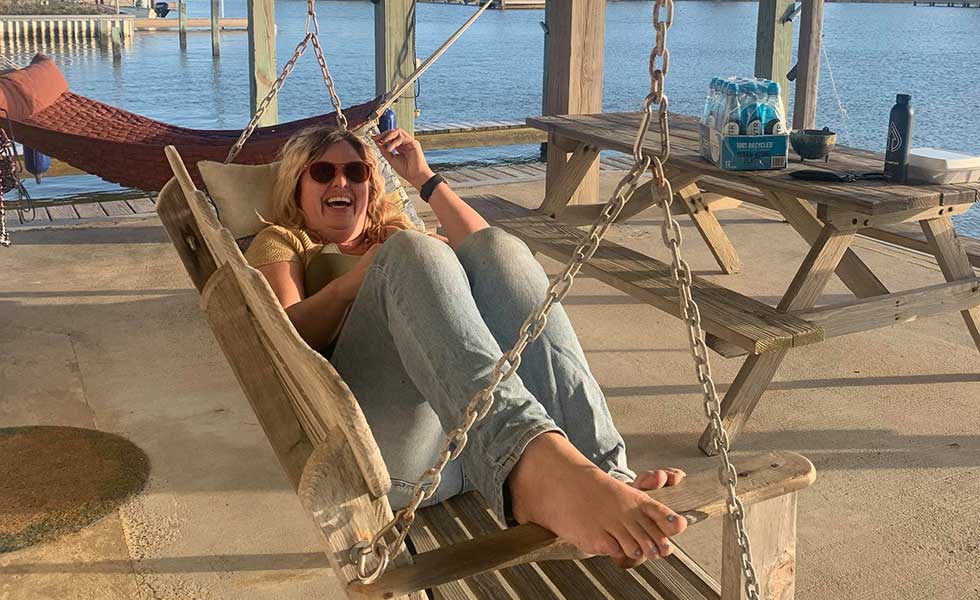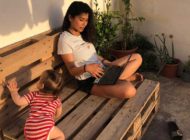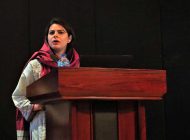Nomadic lifestyle is freedom
– Please tell our readers something about you.
I grew up in Detroit, Michigan and moved to Houston, Texas in my early adulthood. That move followed the first collapse of the auto-industry, which was ruinous to the Detroit economy. As in many American manufacturing hubs, Detroit was what you’d term a “one-horse town” when it came to economics. When Ford Motor Co. began laying off workers, every other industry in the region suffered. This was my first lesson in the potential effects of betting your financial health on a corporate employer.
I currently live in a 1963 vintage travel trailer, along with two large dogs and a lizard! We are presently parked in the Southwestern region of the United States, close to the Rio Grande River. It is hot but beautiful and expansive out here. I planned to stay here for only a month or two but might make it three before I head up the rest of the Western coastline. That’s the beauty of this life though, I never have to stick to a plan!
– You are a full time RV nomad; how did it get started?
I began my nomadic journey just after the start of the COVID-19 pandemic. In response to a devastating layoff and divorce, I had planned to embark on a six-month hike along the Appalachian Trail. It was there that I hoped I could heal and prepare to professionally reposition myself. I sold my house and prepared for my journey. But then, the Pandemic struck. There was so much unknown at the time, that it felt unwise and unsafe to follow through with my hiking plans.
The Appalachian Trail Conservancy also requested that hikers who had not yet started their journey put their plans on hold, out of respect for the rural and vulnerable communities that line the trail who lacked adequate healthcare infrastructure. So, without a solid plan, I completed the sale of the house, moved into a small apartment, and began brainstorming. A few months into the Pandemic, it was clear that I could not carry on simply draining funds from the profits of my house sale. I began researching alternative lifestyles and settled on the idea of becoming a fulltime RV nomad. The goal of the AT hike was to break free of financial and societal chains in order to do some hard self-reflection, and nomadic life seemed as though it could deliver the same. I was correct in this premise and have been on the road now for a full year.
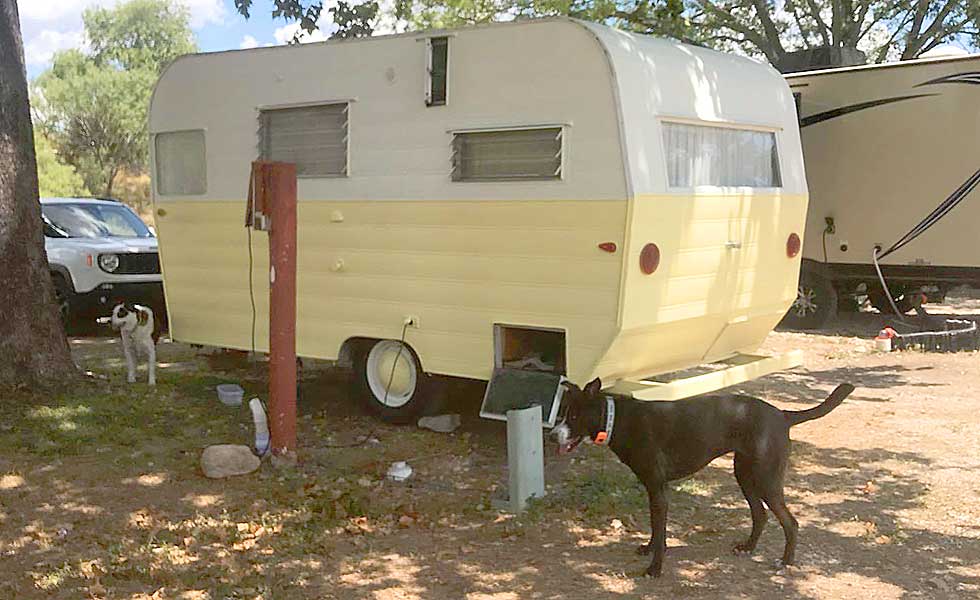
– What are the biggest benefits of nomadic lifestyle?
Freedom is by far the biggest benefit of this lifestyle. If I am unhappy with a place, I move. If I feel burdened by costs in an area, I find somewhere less expensive. If a work opportunity presents somewhere else, I can travel there. Anywhere I go, my home and “office” follows. Fuel is an expense of course, but it is much easier to move your entire home with contents intact than selling a house or waiting on a less to terminate. As a remote freelance worker, I can stay or go… it’s lovely.
– Can you share with us some interesting travel experiences?
As with all things, I would say the most interesting travel experiences have been the unexpected. The first leg of my travels landed me stranded during a Category 1 Hurricane in Galveston, Texas. There was also an unseasonal blizzard and ice storm during the fall months I spent on the border of North and South Carolina. During both, I learned to trust myself, the RV, and the community around me. I don’t use the term “strangers” anymore.
When I land in a new place, the folks around are more accurately, “friends I have not yet met.” People are generally kind and helpful. During the hurricane, we lost all power for several weeks. Other RV’ers shared generator power and food, creating the atmosphere of family amongst individuals who had never before met. I have experienced the same in many places, under many different circumstances. When I lived in large cities, I believe I feared the unknown, especially unknown people. This has all changed, unexpectedly, and in a most profoundly positive manner.
– Have you found a place where you would like to settle permanently, or are you still looking?
I am still looking! There is so much to see and explore first, though. I am in no rush to settle down. Everyone asks me, “when will you stop traveling,” and I have no answer. When you live in one place, it can be a challenge to arrange vacations to visit out-of-town friends and family. I have had the luxury of spending extended time with loved ones all over, and I have many more visits planned on the horizon. In between these destinations, I have fallen in love with so many communities along the way! I feel like a chameleon who can find happiness virtually anywhere.
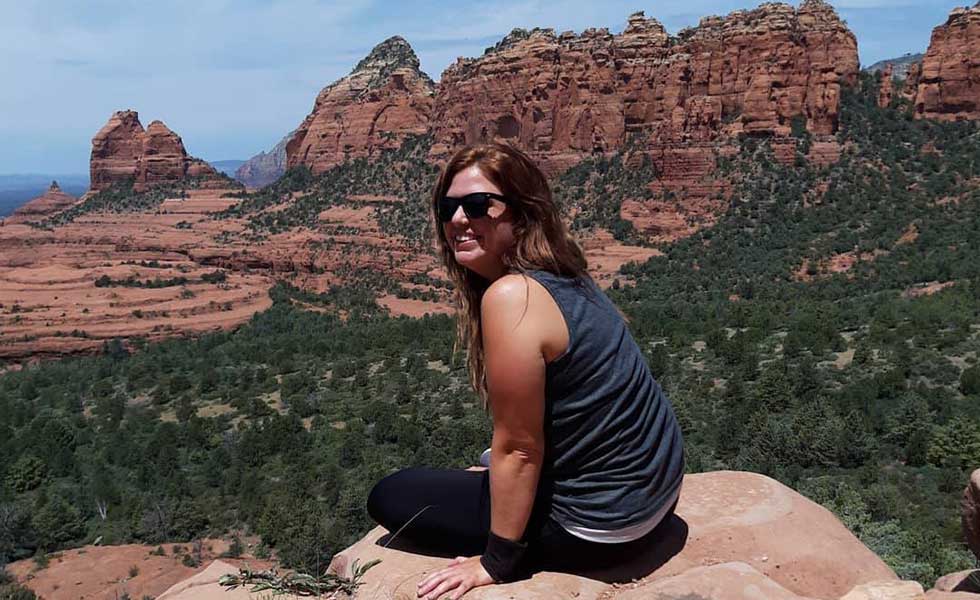
Communication is the key to success
– Tell us something about your first job.
I am a writer and editor, and my first “real” job in the field was reporting for a small newspaper called The Baytown Sun in Baytown, Texas. It did not pay very well, but I loved the work. Writing is something that I have always been called to do. What I loved most about the reporting job was the freedom it afforded. I did report to an office each morning, but I was tasked with finding my own stories to cover, traveling to conduct interviews, and generally self-directing my workday. My comfort in that type of environment was a foreshadowing of where I would eventually land as a fulltime freelancer.
– How has your career continued?
The newspaper industry is volatile, and eventually the meager pay within which became burdensome. I left the industry in search of higher wages. I landed in event planning, which was a very lucrative field before the pandemic canceled most large-scale events. In the event planning arena, clear communication was the key to success, and I had mastered that skill in the newspaper realm already. The Pandemic forced me to change career fields again, as the events industry was not viable amidst lockdown measures. So, I returned to writing and editing, and I am so thankful I was forced to do so.
– Now you have your own company – www.thewritegal.io. How did you get the idea to start such a business?
COVID-19 killed off the event planning industry for a time, but I can’t say there wasn’t a positive angle to being forced out of a job my heart just wasn’t in. I was working long hours and stressed to the max. I earned a very nice salary, and purchased a home because of it, so there were perks. But I can’t say it was worth the stress. It was also stressful to lose my source of income, but I think it was less so than the pressures I had been facing in the workplace. Also, even within event planning, I never left the writing sphere fully. In the event planning company, I morphed into the de facto “company wordsmith.”
I wrote the copy for the company website, helped colleagues edit client emails, and even took on crafting responses to customer concerns. I knew other companies needed this type of help, even more so amidst the changing Pandemic economy. So, after I left event planning, I came up with a company name, got incorporated, and developed a website (www.thewritegal.io). I began small, approaching businesses to let them know I could assist in their client communications during these difficult times, and this was well-received.
– Can you tell us what services your company offers?
I call myself a “wordsmith” – anything having to do with words, I offer. I began with business communication services, but I have expanded into many different arenas. Today, I am most often contracted to assist with self-publish book editing and formatting, the creation of engaging and SEO content for websites, and even essay coaching for college students. The beauty of running the type of company that I do is that I am essentially a “branded” fulltime freelancer. I work on a per-project basis with all of my clients, and I have the freedom to pick and choose who I work with, and on which projects. Every project is a little different, and that is exciting for me! I love learning new skills.
– In your opinion, what are your success habits?
The biggest success habit I have developed is self-promotion, which hinges on the dissolution of the fear of rejection. When I began this business, it seemed scary to approach potential clients that I already knew. I made my website and initially sought out businesses with whom I had no prior working relationship. It took me a little while to have the courage to advertise my services to people I had known personally.
I was afraid I would come off as “pushy,” or “pressuring.” I had to stop and realize; I get junk mail and spam email all the time and it’s no big deal! Leaving a business card with a friend or sending an email to someone I know I can help is no big thing. Now when I travel and meet people, I introduce myself AND my business. That’s the biggest habit I can’t stress enough to new freelancers: tell people what you do! It’s actually easier and more rewarding to help the people you already know. They are also more likely to tell others about your services. There is no downside, it’s all in your head.
Freelancing is safety net
– Why did you decide to start freelancing?
Freelancing is diversified income, in which you retain control. Twice in my life I was negatively impacted by reliance on a single industry. The first time was when the auto industry tanked the economy of my hometown. The second was when a global pandemic completely halted my second-choice career field. I started my writing company, The Write Gal Co., in response, but I resolved to never again rely on just one income stream. I have accounts on Upwork, Guru, LinkedIn, my own website, a thread on Reddit, and am always looking for new arenas for business connection. If one of them goes down, I have safety nets. That flexibility and freedom is the main draw of freelancing, in my opinion.
– The best advice you got or read at the beginning of your career?
Don’t be afraid to take small or unconventional gigs to get started! You might be “qualified” for more, but you need to build connections, testimonials, and a portfolio. Freelancing in general is like a domino effect. It takes a moment to position all the pieces, but once the first domino falls, the rest will follow.
– What are the reasons for your decision to work at Upwork?
Upwork is well-respected in the freelance world, and I appreciate their commitment to integrity. I feel when job connections come through Upwork, I can trust that the client has been vetted.
– What are the advantages of a freelance lifestyle for you?
I am able to work as much or as little as I desire! Because I travel fulltime, some days I will find myself immersed in the beauty of nature, beckoning me to take a week off to explore. Now, I have only to consult with my bank account!
– And what are the disadvantages?
There really are none. I would say in the beginning of my freelance career I was scared of the uncertainty; the ebb and flow of work opportunities is something you have to get used to if you’ve relied on a steady paycheck prior to transitioning to freelance work. I quickly learned that the fear of uncertainty is just a matter of looking at things. It may feel secure to work for someone else, but in reality, they can let you go for any reason, at any time. It is no more certain that working freelance gigs. I feel freelance gigs are more transparent, as you know when the contract is up and can plan ahead!
– What mistakes have you made in your freelance journey?
The biggest mistake I have made is overpromising my time. In the beginning of my career, I wanted to impress new clients so badly that I would set very demanding deadlines for myself. I wanted to be known as a hardworking and fast producer. When I accepted that this was unsustainable, I started adding padding onto the time I would think it necessary to deliver a job. For example, if I landed a contract and expected I could finish within a week, I would tell the client it would take a week and a half, or even two.
When I began finishing projects earlier than expected, I got the client responses I was initially searching for! My client reviews started saying how quickly I worked, and how impressive my delivery time was. The difference was there was absolutely no pressure. Try and remember when starting your freelance career that it is better to under-promise and over-deliver.
– What was the hardest decision you ever had to make as a freelancer?
As a freelancer, the hardest decisions in the U.S. seem to surround tax filing. I wanted to do this all myself, and it was very complicated! It was hard to decide to hire and pay for a professional accountant’s help. Ultimately, this is an expense that saves me so much time and energy. I try to look at it in the same way I hope my own client’s view my services: what is my sanity worth?
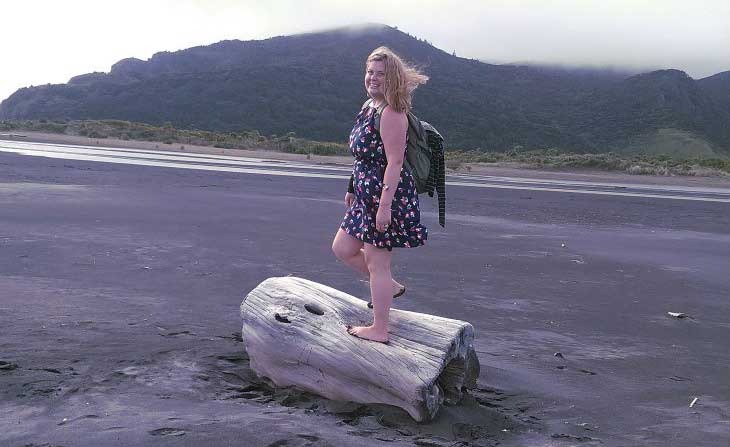
Enthusiasm is common, endurance is rare
– If you could start all over again, what would you do differently?
I would only say that I would continue to bid on projects even while I am stacked with work. In the beginning, I would get a project and work only on that, neglecting the opportunity to prospect for new work until I was finished. It’s important to keep prospecting so you can line up the next gig seamlessly.
– Is there a quote that motivates you?
I have a chalkboard in the RV which I frequently write motivating quotes on! Most recently, I added “enthusiasm is common, endurance is rare.”
– What is your biggest motivation?
Freedom is the biggest luxury of my choice to work as a freelancer and live in an RV, and it is also my biggest motivation to continue. I don’t want to give up this freedom any time soon, so I keep working for it.
– What do you love about your job?
I love making people happy! It is very rewarding to have a skillset that can be put to use helping others. Writing comes naturally for me, but it’s something so many have struggles with. It is very rewarding to hear how I have helped others translate their ideas. I can’t tell you how many times I have been told a client cried when they read my edits or completed copy!
– What do you think is your greatest strength?
The ability to understand what a client needs is definitely my greatest strength. Often times, a client will call because they want one thing, but it’s not exactly what they “need.” Remember, I am a communicator. That’s what writing is! People call me because they’re struggling to communicate something, and I am very skilled at helping them to excavate what precisely that may be.
– Which has been more valuable in your career, your education, or your experience?
Experience, by far. In freelancing, people want to see what other people have to say about you. If you have 20 degrees or certifications but no feedback or samples, you will have a hard time getting hired. Conversely, a portfolio and extensive reviews with no formal education will land you top jobs, quickly. In this arena, demonstrating what you have to offer is king. Also, because there are so many applications for my skillset, a single educational track doesn’t scratch the surface of offerings.
If you want to freelance, just begin
– Several factors are important for success. Can you name some of the most important for you?
I would say diversification is most important. Every freelancer needs to consider how their skillset can be applied in diverse ways. This will allow you to land more gigs and expand your offerings.
– If you had to single out one characteristic that is most important for the success of a freelancer, what would it be?
A freelancer must believe in themselves enough to persevere. You will face rejection and dry spells. You have to believe you will land another job and keep trying. If you persist, you will find success, but you’ve got to hang in there.
– What steps do freelancers need to take to be more successful, in your opinion?
If you’re already freelancing and wondering how you can be more successful, I would begin by asking clients for honest feedback. Be prepared to learn from any criticism as well. When I am ending a job, I always ask a client what they enjoyed about working with me, and if they have any suggestions for things I could do better. When I get these tips, I really appreciate them, because sometimes they reveal perspectives that I never considered but can now integrate into future success.
– What is the best advice you can give to other freelancers?
My best advice is to start now. If you want to freelance, just begin. Make an Upwork profile today. Bid on some small gigs to get your feet wet. Don’t worry if you don’t have all the education credentials or a perfect resume, just start! The rest will follow.
